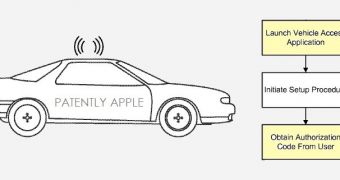Apple’s CEO Tim Cook recently said that the company was working on a technology that we never knew we needed, and a new patent might provide us with a glimpse into such an innovation.
As Patently Apple has discovered, Cupertino has been granted a new patent for a technology that allows an iPhone not necessarily to get access to a car, and thus play the role of traditional car keys, but to provide us with temporary control of a vehicle based on digital access.
Tech for Apple Car?
That does sound complicated, but it all comes down to this: an iPhone, or even another Apple device such as an Apple Watch, could be used to generate an authorization code for a specific user. Interestingly, this user’s authorization code can be restricted in a variety of ways, including time. Furthermore, it might only provide access to certain vehicle capabilities or even limit the speed.
“The primary portable device can limit the types of vehicle-related operations that are accessible when a vehicle is activated by the secondary portable device […],” the patent description reads.
“For example, the usage parameters can limit the accessibility of a vehicle’s operations to a certain period of time (e.g., one hour from transmission of the vehicle access credential, between the times of 1 pm and 3 pm, etc.).”
It goes without saying that such a patent makes everyone think about a future capability of the eagerly anticipated Apple Car, but there’s absolutely no evidence that this technology would ever make it to production. What we know so far is that Apple invented new systems that could expand the functionality of the iPhone, and offering interoperability with a supposed Apple Car only makes sense.
As far as the Apple Car is concerned, Apple is believed to be working at a secret German facility on the project with help from engineers who were previously employed by top car manufacturers in the country, including Mercedes and BMW. Rumor has it that it could launch in 2019 or 2020, so there’s still a long way to go until it might see daylight.

 14 DAY TRIAL //
14 DAY TRIAL //